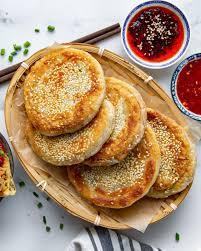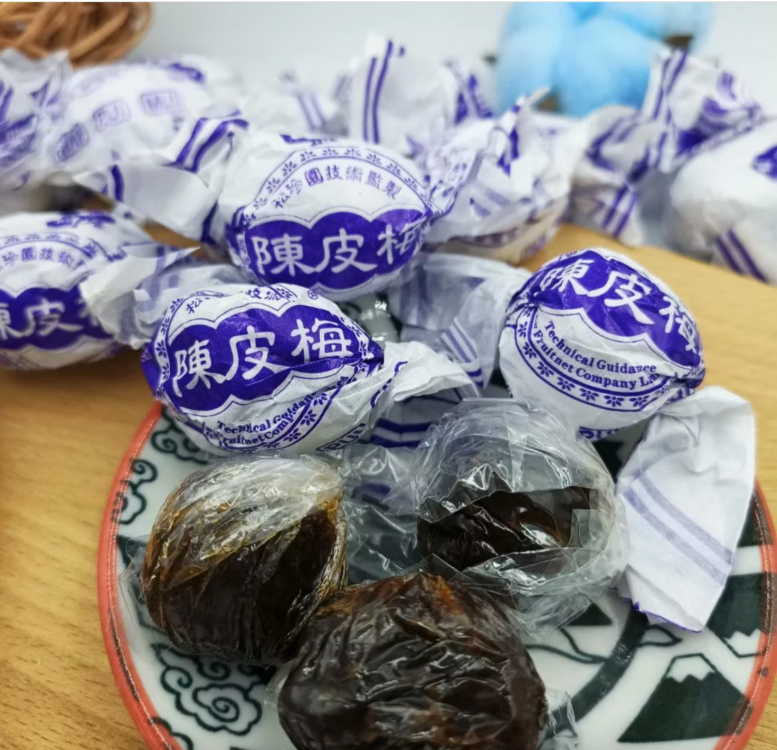-
Posts
580 -
Joined
-
Last visited
Content Type
Profiles
Forums
Store
Help Articles
Everything posted by mudbug
-
Marcsch, I hope this ongoing conversation reaches you. Sometimes it simply takes time for knowledge to be shared. Here is a recipe for you: Crispy Stuffed Flatbread (Guo Kui/锅盔) thanks to Wei, the Red House Spice blogger who created this particular recipe for her viewers. https://redhousespice.com/spiced-beef-flatbread/ Guo Kui (pot helmet) - streetfood Guo kui, a Chinese flatbread, is said to have originated during the Tang Dynasty, around 1,000 years ago. The story goes that a starving laborer building the Qianling Mausoleum cooked a flour-and-water mixture in his tall headpiece, which was similar in name to "guo kui", over a wood fire to satisfy his hunger. The dish became popular with laborers and was even included in the Chinese military's rations. We know the location of origin as Shaanxi today. Guo kui is a type of thin, crispy flatbread that’s cooked sans oil over charcoal in a clay oven.
-

Chan Pei Mui 陳皮梅 (Chinese Preserved Plum Candy) Recipes?
mudbug replied to a topic in China: Cooking & Baking
FauxPas, Thank you. I found that recipe about a month ago. It's close, but not quite the same result. If you read the post, you'll find that they could not find an original recipe either. They are also cutting the fruit up. I have whole fruit in my orchard and want to make it with the whole fruit in tact, which is also the form of the product in the photo of the original post. With such a popular snack, it is strange that there are not tried and true home recipes floating around. -

Chan Pei Mui 陳皮梅 (Chinese Preserved Plum Candy) Recipes?
mudbug replied to a topic in China: Cooking & Baking
Thank you. I'm not in Hong Kong and this is extremely challenging for me to find at any Asian grocery I go to. When I am lucky enough to find any, they have aspartame or sucralose, or other artificial sweetener. I'm looking or a brand that only uses sugar. Seems strange that this is so well loved yet there are no home recipes? Does anyone have access to Chinese internet and can post some recipes here? -
Anyone have a recipe for this? They are getting harder to find in Asian groceries and when I do, they often have sucralose, erythritol, aspartame or other artificial sweetener that makes them distasteful. The main ingredients are licorice, mandarin peel, salt and sugar. Does anyone have any recipes they can source from China? Links, thoughts? It's my all time favorite preserved fruit to eat. Any help would be appreciated.
-
"Why anyone would buy the above two, is beyond me" Because depending on where you are in the world, not everything that is on "display" as "fresh" is fresh. As with farmed produce, flash frozen can often be more fresh than what you see in the produce section due to processing, transportation, storage, display time, handling, etc. Flash frozen is standard and often required even for Japanese chefs to ensure freshness and safety unless of course you are at the Tsukiji Market in Japan.
-
Higher quality Sichuan peppercorns have the hard black seed removed. Learn more: Sichuan pepper Sourcing Hua Jiao (Sichuan Peppercorn)
-

Cantonese White Cut Chicken 白切鸡: Poach, Steam or Sauté?
mudbug replied to a topic in China: Cooking & Baking
"I’m originally from Hong Kong, and my grandma and mom both steam their chickens for 白切雞. They salt the outside and inside, and steam. For a prettier chicken you can rub salt over the skin in a circular motion to exfoliate the skin first. Then we either use a ice bath or rub sesame oil over the chicken for aroma. The poached chicken meat is more tender and soft. Steaming + ice bath makes the meat and skin more bouncy and chewy, which is my preference. We have never served the chicken pink - with the ice bath the breasts are fully cooked and still juicy. I think part of it is using a chicken which isn’t too big - we normally buy a free range chicken for 白切雞." Three generations of home cooking experience. I trust that. -
Looks like they can be fished but you'd have to do more research on when/where and the regulations. A source to purchase: https://www.tryfreshcatch.com/pacific-rock-crab
-
Ah, wonderful! Thank you. I'll save this for next time I'm in Oakland and make the rounds. I hear you on the live crab. "Here's an old trick: Put the crab in the freezer for 15-20 minutes. This does not freeze it, or affect the quality, but it does put it in a sleep/dormant/numb state, so that there is no kicking when you put it in the boiling water." I'd love to try your dumplings sometime. ; )
-
Ah, reminds me of De Buyer by the looks. Also made in France. https://www.debuyer.com/en/products/induction-hob-special-stainless-steel-wok-stainless-steel-tube-handle https://www.francecorner.com/cook/2018-de-buyer-affinity-wok.html This one is less pricey, comes with lid and wok spatula: https://www.amazon.com/Souped-Up-Recipes-Induction-Seasoning/dp/B07RJ39JVL You may find this more recent article of interest: https://theequippedcook.com/induction-wok/
-
Where do/did you find your live crab Katie?
-
You can do either or both, it depends on your personal palate and what your preference is. Sometimes the seeds can be too grainy for certain dishes that are more delicate in texture.
-
I love to make this at home, and have personally introduced the technique to many friends (and their friends) at their homes. They now share the technique with others. It doesn't take that long to do and everyone truly has fun making it and eating it.
-

Cantonese White Cut Chicken 白切鸡: Poach, Steam or Sauté?
mudbug replied to a topic in China: Cooking & Baking
Yes, there would be an initial dip upon adding the chicken to the pot, but it's not like lowering the temperature of a large pot of water and waiting for that water to heat back up to boiling. The time and energy required are far less with steaming. As well as maintenance. Steam for 15 minutes, turn off heat, do not remove lid, sit for 20 (give or take depending on size of bird). -

Cantonese White Cut Chicken 白切鸡: Poach, Steam or Sauté?
mudbug replied to a topic in China: Cooking & Baking
"The skin on white cut chicken is very soft." It doesn't have to be. For those who have access to ice cubes or ice packs to make a very cold water bath to constrict the skin, this can make for a crunchy (not crispy) skin. As discussed here: https://www.youtube.com/watch?v=CkJN9Hy9rsM -

Cantonese White Cut Chicken 白切鸡: Poach, Steam or Sauté?
mudbug replied to a topic in China: Cooking & Baking
Since you do lower in temp and enjoy what you make, keep doing it! Why boiled chicken is.bad: https://www.chefdarin.com/2011/04/why-boiled-chicken-is-bad/ -

Cantonese White Cut Chicken 白切鸡: Poach, Steam or Sauté?
mudbug replied to a topic in China: Cooking & Baking
Perhaps my question has been answered here however steaming is a more consistent gentle heat than poaching and doesn't dilute the flavor into the water so it seems an experiment is in order. https://tasteasianfood.com/chinese-steamed-chicken Thoughts: start with the highest quality organic chicken allowed to free range and process it yourself if possible for optimum inherent flavor, poach and use ice bath for to tighten skin so it's crunchy (not crispy since it's not fried). Preferred chicken: 16 week old "wong mo gai" (Cantonese), "huang mao ji" in Mandarin, more mature, more flavorful. Not bred for breast size. Consider a side by side experiment with one poached and one steamed chicken to see what the differences are with the meat. -

Cantonese White Cut Chicken 白切鸡: Poach, Steam or Sauté?
mudbug replied to a topic in China: Cooking & Baking
There's no need to use an oven to make crispy, chip like chicken skin. A little peanut oil or rice bran oil (or your favorite frying oil) in the bottom of a wok will do the trick. Dry the chicken skin, lightly fry util crisp, sprinkle with salt and MSG. DELISH and oven free. -

Cantonese White Cut Chicken 白切鸡: Poach, Steam or Sauté?
mudbug replied to a topic in China: Cooking & Baking
There's no need to use an oven to make crispy, chip like chicken skin. A little peanut oil or rice bran oil (or your favorite frying oil) in the bottom of a wok will do the trick. Dry the chicken skin, lightly fry util crisp, sprinkle with salt and MSG. DELISH and oven free. -

Cantonese White Cut Chicken 白切鸡: Poach, Steam or Sauté?
mudbug replied to a topic in China: Cooking & Baking
Yes, of course a high quality chicken from your favorite local organic farm at the most appropriate maturity is ideal. Also the way the chicken is de-feathered can make a difference. My understanding based on other's experience is that done by hand, the skin can be more yellow. What a chicken eats can influence skin color. And certain varieties of chickens can have more yellow skin. -

Cantonese White Cut Chicken 白切鸡: Poach, Steam or Sauté?
mudbug replied to a topic in China: Cooking & Baking
I disagree, people appreciate diversity in texture, especially when it's well executed. They don't need to know why or how, and it can be subtle, but they don't need to know, the cook/chef knows how they did it. As in this video, their crunchy skin is what sets them apart and raises them to the upper echelon of this dish. "The most authentic white sliced chicken in Guangzhou" Award winning: https://www.youtube.com/watch?v=CkJN9Hy9rsM -

Cantonese White Cut Chicken 白切鸡: Poach, Steam or Sauté?
mudbug replied to a topic in China: Cooking & Baking
With COVID-19 and people staying at home more, more people have time to plan ahead and enjoy the process. Most of our friends and family enjoy planning ahead, whether it be dry aging meat for weeks, fermenting foods or drinks, growing the plants from seed, etc. -

Cantonese White Cut Chicken 白切鸡: Poach, Steam or Sauté?
mudbug replied to a topic in China: Cooking & Baking
Ah, we prefer bone in. (Meat without bones is boring to me.) On the ice bath, thank you. yes, makes sense. And on the cooking wine adding flavor, that's what they say here: https://www.youtube.com/watch?v=GADCrcagFh0 -

Cantonese White Cut Chicken 白切鸡: Poach, Steam or Sauté?
mudbug replied to a topic in China: Cooking & Baking
I'm not ignoring it, I simply disagree based on the information I presented in my original post. With all due respect, you seem to have not watched any of the videos I provided (many of which from China) which directly contradict your statement "And no one uses Shaoxing wine". The source is a very well respected authority on Chinese Cooking for the content they offer. As for , it may not be called Shaoxing wine where you are. But for the westerners, the term is ubiquitous for the product which is a type of Chinese rice wine that hails from Shaoxing, a city in China’s Zhejiang Province (I do agree with you on this point). Your context may be different in terms of historical authenticity of technique, however you provided no online references or documentation (in English) to support your context. And cooking is an ever evolving phenomena with humans who can absolutely find better techniques to achieve the same (or better) goals—as time, tools, technique and knowledge grow and evolve over time. There can absolutely be ways to improve on classic dishes while maintaining the integrity of the end goal. Steaming is a legitimate heat source, as well as a more uniform heat rather than plunging into boiling water where the temp of the water will go down, then having to bring it to a boiling temperature again before turning the heat off in order to poach. See first two video links provided in original post. If you feel that steaming is not legitimate, then please explain why in terms of meat texture, skin texture, etc. Because when I say steaming, I do not mean overcooking. I mean pick meat that is juicy, succulent, tender. As another example, the best way to boil an egg is to not boil the egg. Bring water to a boil, then turn the heat off to use the residual heat to cook the eggs. Science has found that steaming is by far the most stable, and efficient in terms of time and energy (a little water takes less time to boil). How to Boil the Perfect Egg - The New York Times by Kenji López-Alt (who has decades of experience as a food scientist) https://www.nytimes.com/2019/09/23/dining/how-to-hard-boil-eggs.html I'd appreciate open-minded and nurturing responses rather than being shut down at every turn without context other than I said so. When it is obvious you didn't take the time to watch the videos in my original post before responding. -

Cantonese White Cut Chicken 白切鸡: Poach, Steam or Sauté?
mudbug replied to a topic in China: Cooking & Baking
I'm not looking for baked crunchy skin. If you watch the last video in my original post, you'll learn that they have perfected a cold bath to tighten up the skin to make it cruncy (while not cooking again).






